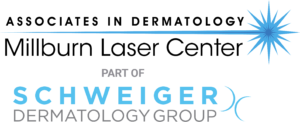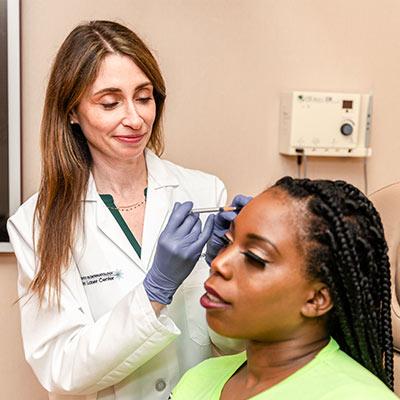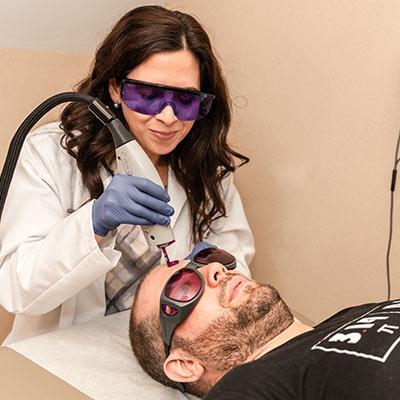Eczema and Psoriasis
Do you have an itch that won’t go away? Are there red blotches on your skin? Eczema or psoriasis could be the culprit. One of our medical dermatologists at Millburn Laser Center in Millburn, New Jersey can help you get an accurate diagnosis. Both skin conditions share similar symptoms, but they have technical differences.
Understanding Eczema and Psoriasis
Eczema, or atopic dermatitis, is an inflammation of the skin. The skin may appear red, inflamed, cracked, or blistered with leathery patches that are sometimes dark. It can cause an intense itch that can get so bad that individuals with eczema can scratch enough to make their skin bleed. Eczema is caused by a hypersensitivity reaction. The skin can overreact to certain triggers, such as soaps, fabrics, dyes, pets, and other irritants.
Psoriasis is a chronic autoimmune condition that causes an overproduction of skin cells. Instead of falling off, dead cells build up on the skin and turn into white, silvery scales. The skin becomes red, irritated, and itchy but is thicker and more inflamed compared to eczema. Aside from itching, the skin may also burn or sting. Some say the feeling is as if you’re getting bitten by fire ants. Just like eczema, psoriasis has known triggers that include cold weather, smoking, alcohol, stress, medications for headaches and high blood pressure, and infections like bronchitis.
- Typical Eczema Sites
Eczema often appears on areas of the body that bend –for instance, the inner elbow or behind the knees. You can also have it on your neck, wrists, and ankles. Babies will sometimes have eczema manifesting on their scalp, cheeks, chin, back, chest, arms, and legs.
- Typical Psoriasis Sites
Psoriasis typically appears on places like your scalp, face, elbows, knees, palms, lower back, and soles of the feet. Patches may also appear on the eyelids, ears, mouth, lips, fingernails, toenails, as well as skin folds.
Who Are Likely to Get Eczema and Psoriasis?
Eczema is more common in infants. According to the Nemours Foundation, About 1 out of every 10 kids will develop eczema and the condition begins to improve by the age of 5 or 6. Others can experience flare-ups throughout adolescence and early adulthood. The condition also occurs in people with a family history of asthma, hay fever, or allergies.
Psoriasis typically develops between the ages of 15 and 35, but it can develop at any age, according to the National Psoriasis Foundation. About 10 to 15 percent of those with psoriasis get it before age 10. Psoriasis is rare in infants.
Treatment for Eczema and Psoriasis
There is no cure for eczema and psoriasis, but you can help manage its symptoms by taking good care of your skin and getting proper medical dermatology treatment.
For Eczema:
- Apply corticosteroid creams to areas that itch
- Apply an antihistamine cream or take an antihistamine such as diphenhydramine
- Avoid harsh soaps with fragrances
- Avoid long, hot showers or baths
- Avoid tobacco smoke
- Apply a cold compress to the affected areas (this provides relief while preventing you from scratching)
- Keep the skin clean and moisturized
Since allergies trigger eczema, you must also avoid substances you’re allergic to (e.g., foods like nuts and eggs, dust, and animals). Keep your surroundings clean by regular dusting and placing dust-protective covers over pillows and mattresses.
For Psoriasis:
- Apply corticosteroids
- Apply moisturizing creams
For moderate-to-severe psoriasis, stronger medications may be prescribed. Examples include:
- Anthralin
- Coal tar
- Salicylic acid
- Synthetic vitamin D creams and solutions
- Topical retinoids
If these topical treatments fail to reduce the occurrence of psoriasis, other medications are available by injection. These include:
- Retinoids
- Cyclosporine
- Methotrexate
- Immune-modulating drugs.
Both eczema and psoriasis can also be treated with phototherapy or light therapy that involves controlled exposure to ultraviolet light and works by slowing down the production of skin cells and reducing skin inflammation. Light therapy is also known to increase vitamin D production and boost the bacteria-fighting systems in the skin.
To learn more about eczema and psoriasis, visit cdc.gov
Frequently Asked Questions
Q: Are Eczema And Psoriasis Contagious?
A: No. Eczema and psoriasis aren’t contagious. Most people with eczema, however, will have family members with the same condition.
Q: How Are They Diagnosed?
A: There is no specific diagnostic test for both eczema and psoriasis. Most of the time, your medical dermatologist should be able to diagnose these conditions with great accuracy by examining your skin and taking your medical history. Rarely, the doctor may take a sample of your skin for a biopsy. This helps identify the specific skin condition and to rule out other disorders. For more details about eczema, visit medlineplus.gov
Q: Can Someone Have Eczema And Psoriasis At The Same Time?
A: Yes. The two conditions can overlap. A child can sometimes have both eczema and psoriasis.
Q: Is Phototherapy Effective for Eczema?
A: Yes. Based on a study, UVB light therapy is an effective treatment for psoriasis. It is estimated that the symptoms improve noticeably or go away completely for a while in 50 to 90 out of 100 people.
Q: Is Phototherapy Effective for Psoriasis?
A: According to the National Eczema Association, about 70% of people with eczema get better with phototherapy. Some people find that phototherapy puts their condition in a “quiet” state for a long time after the end of their treatment.
Q: Does Phototherapy Have Risks?
A: Yes. The most obvious risk is the exposure to UV radiation that can produce genetic mutations, which can lead to skin cancer, including melanoma. Other risks include sunburn and skin aging.
Treat Eczema and Psoriasis at New Jersey’s Millburn Laser Center
Do you suspect that your red, itchy patches are more than just a rash? If you’re concerned about having eczema or psoriasis, visit us at Millburn Laser Center in New Jersey. Our team of board-certified dermatologists can expertly diagnose your condition and recommend the best treatment options for relieving your symptoms and preventing future flare-ups. Contact us at 973.376.8500 today.
Next, read about...
Mohs Micrographic Surgery
Considered the gold-standard treatment for certain skin cancers, Mohs surgery offers our patients the highest cure rates with the lowest risk of recurrence.
Dermal Fillers
Enhance facial contours and improve volume loss with dermal fillers, a completely noninvasive treatment to achieve your aesthetic goals without any downtime.
Laser Treatments
Whether you want to reduce fine lines and pigmentation or remove an unwanted tattoo or hair, with over 25 available lasers, we can tailor a treatment to your unique needs.
Make An Appointment
PATIENT APPROVED
Trusted by Thousands
We are honored so many residents of Millburn and central New Jersey choose us as their family dermatologist.
"From the moment I walked into the practice I was impressed!"
"Millburn laser center and dermatology office are great!"
"The team of professional dermatologists helped guide me."
Opening Hours
Monday: 7:30am - 7:00pm
Tuesday: 7:30am - 4:00pm
Wednesday: 9:00am - 5:00pm
Thursday: 7:30am - 7:00pm
Friday: 9:00am - 5:00pm
Saturday: Please call the office for available Saturday appointments.
Same-Day Appointments Now Available
Phone
Office: 973.376.8500
Fax: 973.376.6295
Location
12 East Willow Street.
Millburn, NJ 07041
Contact Us:
Serving all of central New Jersey!
Associates In Dermatology
Millburn Laser Center
12 East Willow Street
Millburn, NJ 07041
Areas We Serve

5 stars
Based on 1834 reviews


©2024 Schweiger Dermatology Group. All Rights Reserved. Sitemap | Privacy Policy | The information available on this web site is provided for informational purposes only. This information is not intended to replace a medical consultation where a physician's judgment may advise you about specific disorders, conditions and or treatment options. We hope the information will be useful for you to become more educated about your health care decisions. If you are vision-impaired or have some other impairment covered by the Americans with Disabilities Act or a similar law, and you wish to discuss potential accommodations related to using this website, please contact us at 973.376.8500



